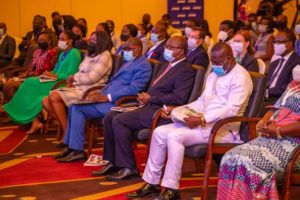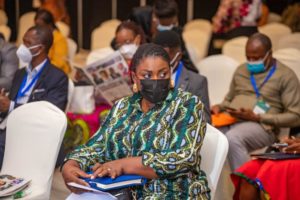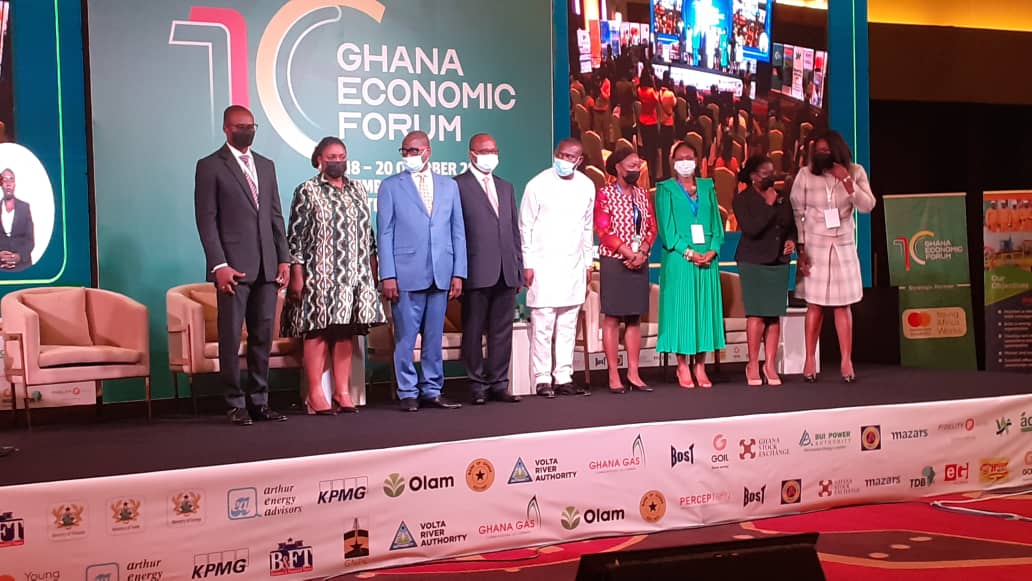
Accra, Ghana//-The Bank of Ghana (BoG) today credited the country’s strong economic performance despite the COVID-19 pandemic to homegrown policy credibility pursued by the monetary and fiscal authorities.
The Governor of BoG, Dr Ernest Addison who made this known at the opening of the 10th edition of the Ghana Economic Forum (GEF) organized by the Business and Financial Times newspaper, explained that, “the relatively strong performance of the economy in spite of COVID-19 was due to home grown policy credibility that had been earned over four years of economic reform”.
He added: “The Fiscal and Monetary Policy Framework that was implemented provided a solid anchor to disinflation. Policy credibility engendered investor confidence which underpinned the significant inflow of capital both portfolio and direct during this period”.
Dr Addison continued: “These measures placed the Ghanaian economy in a good place prior to the pandemic and the necessary policy space to undertake the countercyclical policies that allowed the economy to stay on course.
2022 budget should be used to reset fiscal policy
The 2022 budget should be used to reset fiscal policy to create a more credible path towards medium term fiscal sustainability. This would be an important building block to establish and entrench credibility, a key component to stability”.
This year’s theme on ‘Strengthening Home Grown Policies to Underpin the National Digitisation Drive and Shared Financial Prosperity” seeks to address one of the most topical issues in recent times, especially, at a time when the country is recovering from the pandemic and policies are being put in place to restore stability and economic growth.
As always, it is necessary to take stock of where we are regarding macroeconomic conditions and try to place the discussions within the context of the emerging policy priorities.
Dr Addison who was the guest speaker at the Forum attended by the section of the Ghanaian business community, provided an update on the macroeconomic landscape and move on to discuss how the pandemic has aided the acceleration of digitisation and thereby financial inclusion; and concluded with policies to strengthen National Digitisation and Regulation to address emerging risks in the Digital Financial Services space.
Macroeconomic Landscape
It has been almost 20 months since the shock of COVID-19 pandemic to the Ghanaian economy. The unprecedented adverse global consequences are ongoing, but the good news is that the Ghanaian economy absorbed the shock well, and the economy has begun to turn around very strongly—building back better, according to him.
“The prudent and timely policy support—one may call it “homegrown”, removal of restrictions, reopening of business activities, and increased vaccinations, have worked together to systematically support the recovery process”.
Recent economic indicators show a steady turnaround. First, the impact of the pandemic pushed inflation outside the medium-term target band to 11.4 percent in July 2020.
Since then, inflation has fallen steadily and stayed around the central path of the target band of 8 percent. More recently, impacted mainly by rising domestic and global food prices, inflation has moved steadily outside the target bank, now reading 10.6 percent as at September 2021.
The Bank’s September 2021 forecast however indicates that inflation will remain within the medium-term target band, but closer to the upper limit in the near-term, in the absence of further unexpected shocks.
The above notwithstanding, the Bank’s measure of short-term economic dynamics show that economic activity continues to pick up and maintain steady momentum since the last quarter of 2020.
An annual GDP growth to 3.9 percent
The second quarter data from the Ghana Statistical Service pointed to an annual GDP growth to 3.9 percent in the second quarter of 2021, from the 3.1 percent recorded in the first quarter.
The second quarter growth was somewhat dragged down by the mining and quarrying sectors, which are yet to recover to pre-pandemic production levels.
Beyond the second quarter, the latest high frequency indicators, monitored by the BoG, shows some optimism towards a more robust recovery from the pandemic.
The Bank’s Composite Index of Economic Activity (CIEA) grew by 20.0 percent (year-on-year) in July 2021, compared with 3.9 percent growth in the same month of last year.
The growth in the indicators Dr Addison noted was somewhat broad-based with port activity, imports, domestic VAT, and air-passenger arrivals ranking high.
The external payments position has remained strong despite the decline in the trade surplus due to a stronger import growth, as the economy continues to reopen.
The trade surplus narrowed while the current account deficit widened marginally but was adequately financed by external inflows from portfolio and foreign direct investments, resulting in balance of payments surpluses.

This has allowed a build-up in the country’s gross international reserves, which increased to about 5.2 months of imports cover in August 2021 and provided some buffer to the local currency to withstand pressures.
“Cumulatively, the Ghana Cedi has performed 4 strongly with a year-to-date depreciation of 1.9 percent as at 12 October 2021, relative to 3.0 percent in the same period last year”.
Emerging market policy makers
Emerging market policy makers, the Central Bank Governor observed, were keeping an eye on global financial markets and the US policy direction regarding tapering of asset purchases which may pose some currency risks to emerging markets and frontier economies, such as Ghana.
However, the strong reserve build-up and foreign exchange inflows from the recent SDR allocation and the expected syndicated cocoa loan proceeds should help to cushion currency pressures in the near-term, Dr Addison said.
The comprehensive reforms and recapitalization positioned banks with strong capital buffers before the onset of the COVID-19 shock.
Financial sector received further boost
In addition, the financial sector received further boost with macroprudential regulatory reliefs to ease liquidity constraints and allowed them to provide financial support to critical sectors of the economy as part of the COVID-19 policy responses.
Following these interventions, the banking sector has remained stable, liquid, and profitable. The latest stress tests and macro-prudential risk assessments on the industry show that banks are strong enough to withstand mild to moderate liquidity and credit risk shocks.
A lingering problem
A lingering problem has been private sector credit growth which has not fully recovered to pre-pandemic levels due to uncertainties surrounding the pandemic’s trajectory, Dr Addison noted.
“As the momentum in economic activity picks up, coupled with continued COVID vaccination efforts, and demand for bankable projects increase, we expect private sector credit to rebound”, he assured.
106 1D1F factories are in operation
A Deputy Minister for Trade and Industry, Nana Ama Dokua Asiamah-Adjei, revealed that 106 factories under the government’s One District One Factory (1D1F) policy are currently in operation.

She was therefore confident that the policy would achieve its targeted objective of creating jobs for the teeming unemployed Ghanaian youth while moving the country towards greater industrialization.
On course to create 3million jobs for Ghanaians
The Regional Director West, Central and Northern Africa-Mastercard Foundation, Madam Nathalie Akon Gabala, said her Foundation was on course to create 3million jobs for Ghanaian youth by 2030.
She used the well attended Forum to appeal to the government and the business community to bring everyone to the digitalization table for the benefit of all.
The Chief Executive of the Ghana National Petroleum Corporation (GNPC), Dr. K.K. Sarpong, who is chairing the three-day event, added that the development of human capital is key for the socio-economic development of the country.
While the Chief Executive Officer of the Business and Financial Times, Dr Godwin Acquaye used the opportunity to thank the sponsors of the Forum for the past 10 years.
African Eye Report


